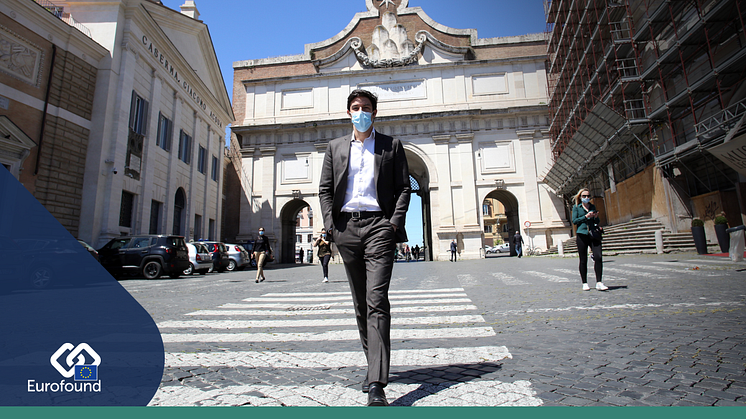
News -
COVID-19 places further strain on Italian labour market and financial security
Eurofound’s recent research shows that COVID-19 has placed further strain on the Italian labour market and places people across the country in greater financial insecurity. The recent Living, working and COVID-19 online survey reveals that over a third of people in Italy have reported loss of employment due to the COVID-19 pandemic and more than half of workers who remained in employment reported a decrease in working hours. Previous research from Eurofound highlighted existing vulnerabilities in the Italian labour market, with Italy having the second highest level of non-standard employment in the EU, increasing notably from 2008 to 2018.
The First Findings from Eurofound’s Living, working and COVID-19 online survey, which amassed over 85,000 responses in April, show that 34% of respondents in Italy had lost employment (or contracts in the case of the self-employed), either permanently or temporarily, since the onset of the pandemic. This is coupled with more than half of those remaining in employment reporting a decrease in working hours due to the COVID-19 crisis – the fourth highest level across the EU at 58.9%. The findings show that, in terms of employment status, self-employed with employees and self-employed without employees were affected most severely by the crisis.
Job loss and reduced working hours are likely to have had an impact on the financial situation of many households, as 46% of respondents in Italy report that their financial situation has worsened, when compared to the period prior to the crisis. Furthermore, 20.9% of respondents in Italy reported having great difficulty making ends meet with their household’s income and 11.3% were in arrears in rent or mortgage payments in the previous three months. As 21% of respondents in Italy reported feeling afraid of losing their job in the coming three months, compared to the EU average of 16%, a larger proportion may be exposed to financial insecurity in the months ahead.
Eurofound’s previous research on labour market change reveals that Italy has the second highest level of non-standard employment in the EU – second only to Greece. Over the last decade, there has been considerable growth in the share of temporary employment, involuntary part-time employment and self-employment in Italy. The research shows that the share of temporary employment in Italy increased from 13.3% to 17% between 2008 and 2018. Furthermore, Italy now reports the second highest share of involuntary part-time employment in the EU, increasing from 40.2% of all part-time employment in 2008 to 64.2% by 2018. The share of workers who are self-employed has also increased during that period to 23.7% of all employment – also the second highest level across the EU. The report identifies that workers on non-standard contracts and those who are self-employed often have less formal or less effective coverage from social benefit schemes and therefore may be more likely to be exposed to financial hardship, particularly in times of crisis.
Although COVID-19 has created unprecedented challenges for communities across Europe, it does not appear to have weakened community cohesion or family support in Italy. Findings from the Living, working and COVID-19 survey show respondents in Italy report higher than average levels of support from friends, family and organisations, with 89.7% having access to some level of support with household tasks if they become ill. Furthermore, the survey findings show that trust in the national government is 5.3 in Italy (on a scale of 1-10), which is above the EU average of 4.8. These findings may be promising indicators of solidarity in society as the country grapples with the fallout from the COVID-19 pandemic.
Eurofound has been monitoring and reporting on living and working conditions in Italy, in comparison to other EU Member States, since the inception of the agency in 1975.
Read more:
Publication: Living, working and COVID-19: First findings – April 2020
Publication: Labour market change: Trends and policy approaches towards flexibilisation





